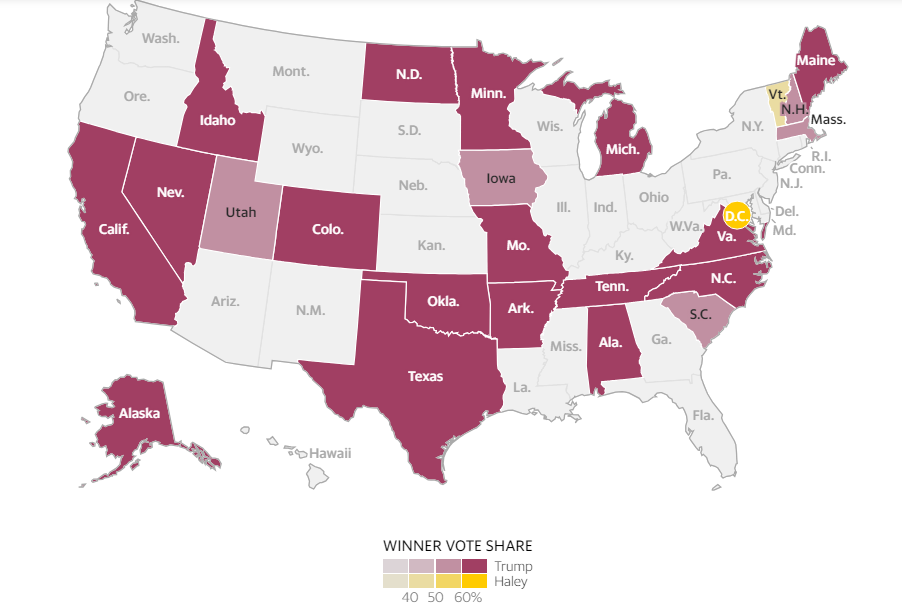
Donald Trump at an election night watch party at Mar-a-Lago on Tuesday. (Win McNamee/Getty Images)
Trump defeats Haley in nearly every Super Tuesday state, setting stage for 2024 rematch with Biden
Yahoo!news: Former President Donald Trump swept nearly all of this year’s Super Tuesday primaries and caucuses, routing his last major rival for the Republican presidential nomination, former South Carolina Gov. Nikki Haley, and putting him within striking distance of a November rematch with President Biden, the Democrat who beat him in 2020.
Biden also won lopsided victories on Tuesday across 15 states.
Trump, who gained several hundred delegates with major wins in states such as California and Texas, is now on the verge of becoming the GOP’s presumptive nominee for the third straight election cycle.
His only loss as of 11 p.m. ET was in Vermont, where Haley scored a narrow upset.
“Nov. 5 is right around the corner,” Trump said from his Mar-a-Lago club in Florida, referring to Election Day. “Nov. 5 is going to go down as the single most important day in the history of our country.”
In a statement, Biden said that "tonight’s results leave the American people with a clear choice: Are we going to keep moving forward or will we allow Donald Trump to drag us backwards into the chaos, division, and darkness that defined his term in office?"
A full 854 GOP delegates were up for grabs Tuesday — more than a third of this year's total. A candidate needs 1,215 delegates to clinch the 2024 Republican nomination. Trump’s delegate advantage is continuing to grow as results come in from around the country.

In a presidential nominating election, whoever is first to collect a majority of the total available delegates — or whoever remains after everyone else has dropped out — becomes the party’s presumptive nominee. After the last states weigh in, delegates attend their party’s national convention and vote to make the nomination official.
Barring unforeseen circumstances, Trump is on track to reach the 1,215-delegate mark by March 19 at the latest — and to formally claim his party’s nomination when all GOP delegates cast their ballots at the Republican National Convention in July.
Given Tuesday’s results, Haley could exit the race in the days ahead. She did not speak Tuesday night. In previous comments, the former governor has refused to say whether she will keep campaigning beyond this week, telling reporters that Super Tuesday was “as far as I’ve thought in terms of going forward.”
How Trump won Super Tuesday
Nikki Haley campaigning in South Burlington, Vt., on Sunday. (Michael Dwyer/AP)
Haley went into Super Tuesday with a bit of wind at her back. She won the Washington, D.C., primary on Sunday — her first primary victory and the only primary victory ever for a woman Republican presidential candidate. A few days earlier, Haley was endorsed by Sen. Lisa Murkowski of Alaska and Sen. Susan Collins of Maine, two centrist Republicans from Super Tuesday states.
But in the end it wasn’t enough. Maine went for Trump, along with other moderate-leaning states where Haley’s campaign had hoped to make inroads, such as Massachusetts and Virginia. Vermont could turn out to be Haley's only Super Tuesday prize.
Until recently, Haley had been able to focus on one state at a time. She spent heavily in New Hampshire and South Carolina, placing second in both with about 40% of the vote — due in large part to her outsize support among independent voters, who were allowed to participate in those states’ open primaries.
But in Michigan's Feb. 27 primary, where Haley invested far less time and money, she hit only 27%.
Super Tuesday was like Michigan on steroids. In contrast to earlier, proportional contests, most of the day’s primaries and caucuses awarded all of their delegates to the candidate who cleared 50% of the vote. And in some, only Republicans could participate.
Both rules helped Trump expand his lead to the point where it’s now mathematically prohibitive for Haley to catch up.
What the polls say about November
Voters cast their ballots for the presidential primary in Edina, Minn., on Tuesday (Anthony Souffle/Star Tribune via Getty Images)
Both Biden and Trump are strikingly unpopular. On average, 55% of Americans disapprove of Biden’s performance in office; just 38% approve. Those numbers have barely budged for years, despite the end of the COVID-19 pandemic, the passage of ambitious legislation and the steadily improving U.S. economy.
Analysts have speculated that widespread concerns about Biden’s age are weighing him down with the electorate. (Already the oldest president in U.S. history, he would be 86 at the end of a second term.)
Trump, meanwhile, left office in 2021 with roughly the same poor approval numbers that Biden has now — and recent polls indicate that a clear majority of Americans still disapprove of him today.
As a result, head-to-head surveys have long shown Biden and Trump roughly tied, with support in the mid-40s; average all the polls together, and Trump might start with a 2-point edge, at best.
In line with those numbers, the latest Yahoo News/YouGov survey finds Trump with the narrowest of leads (45% to 44%). But when voters are asked how they would vote if Trump is convicted of a serious crime, Biden pulls ahead, 46% to 40%.












Leave a review